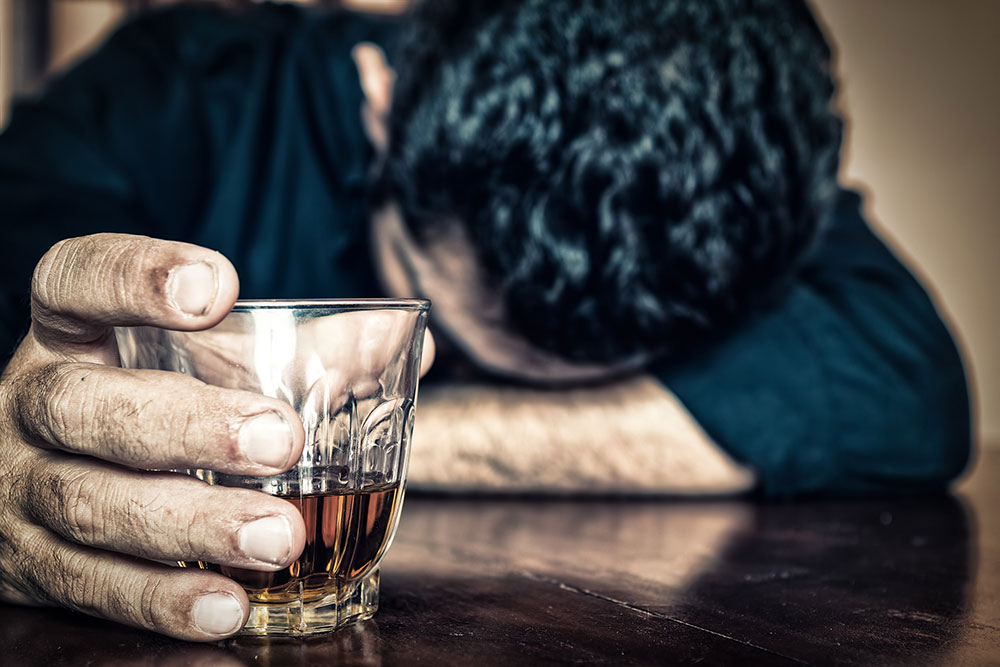Many people say they drink alcohol because it makes them adventurous, confident, and happy. They use drinking as a means of socializing and lowering their inhibitions so they can explore and try new things. Other people use this exuberant effect of alcohol to lift themselves out of a depressive funk.
The dark truth is that these stimulating effects are short-lived, and once they wear off the drinker crashes, suffers hangovers, or falls into an even deeper depressive state. Learning about the deeper effects of alcohol on your mental health can help you avoid the risks of depression from alcoholism. At Spero Recovery Center we offer a men’s residential rehab program where we offer addiction treatment and support for your recovery.
Is Alcohol Really A Depressant?
Alcohol is a globally consumed substance that, in excess, has various effects on your body and mind. Many people drink alcohol to feel happier, or calmer, or for a confidence boost, but alcohol is classified as a type of drug known as a depressant, meaning it slows the activity levels of the central nervous system (CNS). The depressant effects of alcohol lower inhibitions, cloud reasoning, and impairs judgment. Alcohol rehab in Colorado will address these side effects and addiction therapy can help improve symptoms and overcome cravings.
What Are The Effects Of Alcohol On The Central Nervous System?
In excess, alcohol alters neurotransmitters in the brain. These neurotransmitters are chemicals that are responsible for transmitting signals and information between nerve cells. Alcohol, in the short run, increases dopamine and serotonin release, and this can explain why some people feel good or euphoric when they drink. This effect is only temporary, though, and these neurotransmitter levels quickly drop.
Alcohol also affects the brain by amping up gamma-aminobutyric acid (GABA) activity, the neurotransmitter that slows down the firing of nerve cells. This makes the drinker feel more relaxed, tired, or sleepy, but at the cost of impairing the drinker’s judgment, memory, coordination, and reaction time.
The effects of alcohol on the brain can vary depending on the amount, frequency, and duration of drinking, as well as the individual’s age, gender, genetics, and other factors. However, in general, drinking too much alcohol or drinking alcohol regularly can have harmful effects on the brain and the body. Some of the possible consequences of alcohol misuse include.
- Depression. Alcohol can cause the symptoms of depression, such as low mood, hopelessness, guilt, and suicidal thoughts to worsen, and it can also make antidepressant medications less effective. Drinking alcohol to cope with depression creates a vicious cycle of dependence and addiction that makes recovering from either condition that much harder.
- Anxiety. Alcohol has been known to make the symptoms of anxiety, such as nervousness, fear, panic, and phobias worse in intensity and last longer in duration. Misusing alcohol can make a heavy drinker suffer withdrawal symptoms (tremors, sweating, nausea, and insomnia) which increase the anxiety levels and increase the risk of anxiety attacks altogether.
- Insomnia. Alcohol abuse can disrupt the quality and quantity of sleep you get every night. This will adversely affect your overall mood, awareness, and health.
- Brain damage. Alcohol damages the physical makeup of the brain and prevents it from functioning normally. Alcohol can also make your brain shrink in size, and this is bad news for the areas of the brain that control memory, learning, and emotion. Excessively drinking alcohol can also cause your brain to become inflamed, or swell in size, and aside from the very bad headaches this brings, the communication and coordination of the brain cells will be negatively impacted.
Depressants Vs. Stimulants
Substances are broadly categorized as either stimulants or depressants, both exerting distinct effects on the central nervous system (CNS). They share the commonality of influencing the CNS and impacting an individual’s mental and physical state. However, there are several differences, including:
Depressants
- Slow down CNS activity, inducing relaxation, calmness, and drowsiness
- Effectively reduce anxiety, stress, and pain
- Compromise judgment, impair memory, and impede coordination
- Carry risks of addiction, overdose, withdrawal, and an increased likelihood of accidents, injuries, violence, and suicide
- Examples include alcohol, benzodiazepines, barbiturates, and opioids
Stimulants
- Accelerate CNS activity, promoting heightened alertness, energy, and focus
- May trigger anxiety, paranoia, insomnia, and increased aggression
- Enhance alertness, energy levels, and concentration
- Pose risks such as heart problems, stroke, and seizures
- Examples include caffeine, nicotine, cocaine, methamphetamine, MDMA, and prescription stimulants like synthetic adrenaline
How Does Alcohol Affect Mental Health?
Alcohol is a part of society in many ways, used for socializing, sealing business deals, forging connections with people, and pairing with good food for a satisfying meal. Used in excess, alcohol can hurt your mental, emotional, and physical health, and it can also worsen symptoms of anxiety, depression, and other mental health issues. A generalization of how alcohol can affect your health is below.
- General Impact: Alcohol is a depressant, slowing brain activity and disrupting the chemical balance regulating emotions, thoughts, and behaviors. Moderate use may induce temporary relaxation, but the ensuing withdrawal effects can worsen overall well-being.
- Cognitive Effects: Impaired judgment, memory, and concentration make it challenging to cope with stress and negative emotions.
- Sleep Disruption: Alcohol disrupts sleep, leading to poor quality and shorter durations, contributing to irritability and discomfort.
- Physical Health Risks: Alcohol misuse can lead to liver disease, heart problems, stroke, and cancer.
- Dependency Cycle: Escalating alcohol use to alleviate unpleasant feelings can result in addiction, withdrawal symptoms, and increased depression and anxiety.
- Mental Health Impact: Aggravates existing mental health conditions and may trigger new ones, reducing the effectiveness of certain medications.
- Impact on Life and Relationships: Alcohol abuse negatively affects relationships, work, finances, and self-esteem, elevating the risk of self-harm and suicide.
What Are Signs of Alcohol Abuse and Depression?
Alcohol abuse and depression are two conditions that often occur together and adversely affect each other. At Spero Recovery Center we can provide support for a dual diagnosis in Colorado. Some of the signs of alcohol abuse and depression are:
- Feeling despondent, hopeless, worthless, or empty most of the time
- Having a disinterest in activities you once loved
- Drinking excessively despite the negative effects it has on your health, professional life, and social connections
- Craving alcohol most of the day and night and having difficulty stopping or cutting down
- Experiencing withdrawal symptoms when you try to quit or go any length of time without having a drink
- Having trouble with your sleeping, concentration, or memory
- Feeling irritable, angry, or restless
- Having self-harming or suicidal thoughts
What Are the Side Effects of Alcohol and Other Depressants?
Some common side effects of alcohol and other depressants are:
- Drowsiness, fatigue, and sleep problems
- Slurred speech, impaired coordination, and poor judgment
- Low blood pressure, slow heart rate, and slow breathing
- Nausea, vomiting, and stomach ulcers
- Increased risk of liver damage, seizures, and some cancers
Combining alcohol with other depressants can have serious and potentially life-threatening consequences, leading swiftly to hospitalization due to the risk of overdose, coma, or even death. The combined effect of these substances amplifies their dangers, significantly increasing the likelihood of severe respiratory depression, unconsciousness, and organ failure. The gravity of such interactions necessitates utmost caution and avoidance to safeguard one’s well-being.
Frequently Asked Questions About Alcohol and Depression
Alcohol and depression are interconnected in a symbiotic relationship, meaning each one feeds off of the other. Many people turn to alcohol as a way to cope with mood problems not knowing that drinking alcohol contributes to symptoms of depression. Alcohol affects how antidepressants work, which can stop depression treatment in its tracks.
Drinking too much alcohol is a risk factor for developing and worsening depression. Alcohol is a depressant, which means it can lower your mood, reduce your energy, and increase your anxiety by interfering with the balance of brain chemicals that affect your mood.
The best way to treat alcohol use and depression is to address both conditions at the same time in a process known as dual-diagnosis treatment for co-occurring disorders. Treatment for both conditions may involve a combination of medication, talk therapy, and support groups, and this will ultimately improve your quality of life and well-being for years to come.
A standard drink in the U.S. contains about 14 grams (0.6 ounces) of pure alcohol, which is equivalent to 12 ounces of beer, 5 ounces of wine, or 1.5 ounces of liquor.
Moderate drinking is accepted as up to one drink per day for women and up to two drinks per day for men, according to the Dietary Guidelines for Americans. Drinking less is always better for health than drinking more.
Binge drinking is a pattern of drinking that brings blood alcohol concentration (BAC) levels to 0.08 g/dL or higher, which typically occurs after four drinks for women and five drinks for men in around two hours. Binge drinking can increase the risk of injuries, violence, liver disease, and some cancers.
Excessive alcohol use increases the risk of developing health problems such as injuries, violence, liver diseases, and cancer. It can also cause alcohol use disorder (AUD), which is a chronic brain disease characterized by obsessional alcohol use, loss of control over alcohol intake, and a negative emotional state when not drinking.
Alcohol, Depressants, and Seeking Help. The Path to Recovery
If you’re still in denial about your alcohol use or can’t tell whether or not you’re dependent, Spero Recovery is here to help. We offer modern, comprehensive, and evidence-based treatment methods to help you recover and get your life back on track
Contact us today to speak with our admissions team about enrollment, ask any questions you may have, or schedule a tour of our facilities to see what we can offer you.






